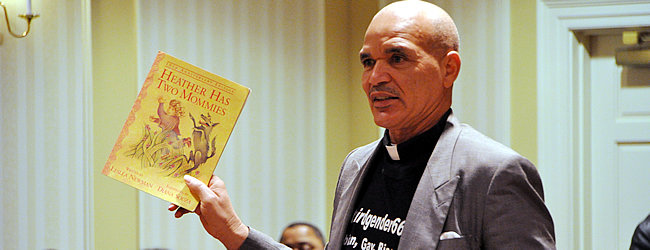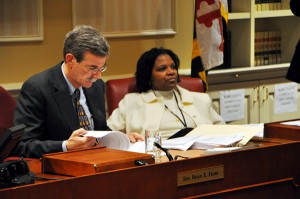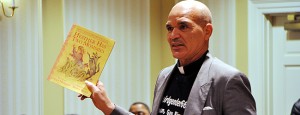Local
Ugly testimony at Md. marriage hearing
Opponents invoke pedophilia, incest while denouncing bill

ANNAPOLIS, Md. — As many as 300 supporters and opponents of a bill to legalize same-sex marriage in Maryland packed the halls of a State Senate office building in Annapolis Tuesday while several dozen witnesses testified on both sides of the issue.
The Democratic-controlled Judicial Proceedings Committee, which conducted a hearing on the bill, was expected to approve the measure and send it to the full Senate within the next week or two.
A majority of the members of the 11-person committee are co-sponsors or supporters of the bill, the Religious Freedom and Civil Marriage Protection Act.
Most political observers believe supporters have the votes to pass the bill in the Senate and the House of Delegates. Gov. Martin O’Malley has said he would sign the bill.
But opponents, led by Maggie Gallagher, chair of the National Organization for Marriage, said they remain hopeful that supporters would fall short of obtaining the 24 votes needed to pass the bill in the Senate or the 29 votes needed to stop a Senate filibuster.
“Marriage is the union of husband and wife for a reason,” Gallagher said in her testimony. “These are the only unions that can make new life and connect children in love to their mom and dad … If Maryland adopts this radical new view of marriage, it will have consequences,” she said.
Many of the witnesses testifying against the bill — including ministers, an orthodox rabbi, and two Roman Catholic priests — picked up on Gallagher’s view that procreation is the cornerstone of marriage. They said changing the definition of marriage to include same-sex couples would have a detrimental impact on families and society.
An equal number of witnesses, including a Catholic nun and Catholic lay leaders, two reform rabbis and at least a half-dozen Protestant ministers, both black and white, disputed those assertions, saying they believe same-sex unions strengthen rather than harm the family. Many of the witnesses backing the bill identified themselves as people of faith.
“My God loves everyone,” said Elbridge James, a lobbyist for the NAACP and director the Maryland Black Family Alliance.
“My God did not make a mistake,” he said. “And so if you were gay, my God did not make a mistake. If you were lesbian my God did not make a mistake. If you were transgender, my God did not make a mistake. And tonight, when I go home to my wife, nothing will deter me from loving my wife — certainly not if there’s a bill that protects gays, protects lesbians or protects the transgender community.”
Several of Maryland’s gay elected officials testified in favor of the bill. Among them was Sen. Richard Madaleno (D-Montgomery County), a co-sponsor of the bill who has been a longtime advocate for marriage equality in the state. Others included Chevy Chase, Md., Mayor David Loveland and Howard County Register of Wills Byron Macfarlane.
Among Republicans testifying in support of the bill was Sen. Allan Kittleman (R-Howard & Carroll Counties). Kittleman, the former Senate minority leader, initially planned to introduce a civil unions bill as a possible alternate measure to the marriage bill. Two weeks ago, he dropped those plans and announced his enthusiastic support for the marriage measure.
“I stand here as a strong Republican,” he told the committee, adding that he believes marriage equality is in full keeping with Republican principals of individual freedom.
Sen. Brian Frosh (D-Montgomery County), chair of the committee, said at the start of the hearing that more than 140 people signed up to testify.
Their names, organizational affiliation and information on whether they were for or against the bill weren’t immediately available because the committee did not release a witness list on the day of the hearing.
In a procedure unlike the equally packed hearing for a same-sex marriage bill approved by the D.C. City Council last year, the Judicial Proceedings Committee in Maryland required witnesses to sign up in person to testify on the morning of the hearing, preventing the committee from compiling an advance witness list and releasing it to the media.
Based on the testimony delivered during the day, it appeared that the witnesses were about equally divided between supporters and opponents of the bill. As Frosh and Sen. Lisa Gladen (D-Baltimore City), the committee’s vice chair, called witnesses to testify, many were not present, indicating that a significant number chose not to wait their turn to speak at a hearing that lasted more than six hours.
Lisa Polyak, a board member and spokesperson for Equality Maryland, the statewide LGBT organization that coordinated testimony in support of the bill, said the group lined up about 48 supporting witnesses. She said others supporting the bill, including a number of same-sex couples, came on their own.
“We were extremely gratified for all of the families that came out, all of our community partners, and all of the clergy that came out to speak their truth and support us,” she said. “I don’t think we could have had a better diversity of representation.”
Among those testifying was Polyak’s and her partner, Gita Deane’s daughter, 14-year-old Maya Deane-Polyak, a freshman at Baltimore’s Bryan Mawr High School.
“My moms’ first concern has always been my sister and I,” said Maya. “They make sure our every need is met, whether it is helping us with homework, driving us to a friend’s house or merely just being there to cheer us up when we are sad — they do it all and even more.”
Noting that she has witnessed first-hand examples of how her two moms encounter discrimination because they can’t marry in Maryland, she urged the committee to promptly approve the marriage bill.
“So I ask you to please consider, consider the fact that you have the power to change my family’s life when you make your decision,” she said. “I want our moms to be married. You have the power to make that happen.”
Many of the witnesses opposing the bill said broadening marriage to include same-sex couples would weaken the family structure and harm children. Several said children of same-sex parents don’t do as well in school and show greater signs of emotional problems compared to kids of opposite-sex, married parents. LGBT activists have said those assertions are not supported by impartial studies.
Austin Nimocks, senior legal counsel for the Alliance Defense Fund, a conservative litigation group that challenges same-sex marriage laws throughout the country, testified that restricting marriage to opposite-sex couples insures that children are raised by a “stable family.”
He said “responsible procreation” is a key reason why Maryland and other states should not legalize marriage for same-sex couples. By pushing to “redefine” marriage to include gay and lesbian couples “you are telling people that mothers and fathers don’t matter,” he told the committee.
In response to questions by committee member Jamie Raskin (D-Montgomery County), a co-sponsor of the marriage bill, Nimocks acknowledged that some same-sex couples may make good parents, saying “you can find individual circumstances that go against a general rule.”
But other witnesses opposing the bill said there could be no exceptions to their religious-based belief that child rearing by same-sex parents is always harmful to children, both psychologically and spiritually.
“That union of our parents was a sacred right granted to them by almighty God,” said Timonium, Md., resident Gerard Selby. “God’s design for the human race was that it be procreated by the union of a man and a woman.”
He added, “Where do we draw the lines? What comes next? If a man loses his wife to a premature death, shouldn’t he be allowed to marry his daughter, or son, or both?
Leroy Swales, an Oxon Hill, Md., resident who testified last year against the D.C. same-sex marriage bill, told the committee Tuesday that approval of the bill, among other things, would result in Maryland’s elementary schools using the book “Heather Has Two Mommies,” which he called a “pedophile book,” as a teaching aid for students.
Saying that homosexuality is related to an “electrical imbalance of the brain,” he called on the committee to use “science” and biblical scriptures as justification for defeating the bill.
District of Columbia
Gay GOP group hosts Ernst, 3 House members — all of whom oppose Equality Act
Log Cabin, congressional guest speakers mum on June 25 event

U.S. Sen. Joni Ernst (R-Iowa) and three women Republican members of the U.S. House appeared as guest speakers at the June 25 meeting of Log Cabin Republicans of D.C., the local chapter of the national LGBTQ Republican group with that same name.
The U.S. House members who joined Ernst as guest speakers at the Log Cabin meeting were Celeste Maloy (R-Utah), Kat Cammack (R-Fla.), and Julia Letlow (R-La.).
Neither D.C. Log Cabin Republicans President Andrew Minik nor spokespersons for Ernst or the three congresswomen immediately responded to a request by the Washington Blade for comment on the GOP lawmakers’ appearance at an LGBTQ GOP group’s meeting.
“Please join us for an inspiring evening as we celebrate and recognize the bold leadership and accomplishments of Republican women in Congress,” a D.C Log Cabin announcement sent to its members states.
“This month’s meeting will highlight the efforts of the Republican Women’s Caucus and explore key issues such as the Protection of Women and Girls In Sports Act and the broader fight to preserve women’s spaces in society,” the message says.
It was referring to legislation pending in Congress calling for banning transgender women from participating in women’s sports events.
According to media reports, Ernst and the three congresswomen have expressed opposition to the Equality Act, the longstanding bill pending in Congress calling for prohibiting discrimination based on sexual orientation and gender identity in the areas of employment, housing, and public accommodations.
The Log Cabin announcement says the meeting was scheduled to take place at the Royal Sands Social Club, which is a restaurant and bar at 26 N St., S.E. in the city’s Navy Yard area.
D.C. Log Cabin member Stuart West, who attended the meeting, confirmed that Ernst and the three congresswomen showed up and spoke at the event.
“It was a good turnout,” he said. “I would definitely say probably 30 or 40 people attended.” West added, “Four women came to talk to a group of mostly gay men. That’s something you don’t see very often.”
District of Columbia
D.C. police seek public’s help in July 5 murder of trans woman
Relative disputes initial decision not to list case as hate crime

D.C. police are seeking help from the public in their investigation into the murder of a transgender woman who they say was shot to death at about 12:30 a.m. on Saturday, July 5, on the 2000 block of Benning Road, N.E.
But the police announcement of the fatal shooting and a police report obtained by the Washington Blade do not identify the victim, 28-year-old Daquane ‘Dream’ Johnson of Northeast D.C., as transgender. And the police report says the shooting is not currently listed as a suspected hate crime.
It was local transgender activists and one of Johnson’s family members, her aunt, who confirmed she was transgender and said information they obtained indicates the killing could have been a hate crime.
“On Saturday, July 5, at approximately 12:51 a.m., Sixth District officers were flagged down in the 2000 block of Benning Road, Northeast, for an unconscious female,” a July 5 D.C. police statement says. “Upon arrival, officers located an adult female victim suffering from gunshot wounds,” it says.
“D.C. Fire and EMS responded to the scene and transported the victim to a local hospital where after all lifesaving efforts failed and the victim was pronounced dead,” the statement says.
A separate police flyer with a photo of Johnson announces an award of $25,000 was being offered for information leading to the arrest and conviction of the person or persons responsible for the murder.
The flyer identifies D.C. police Homicide Detective Natasha Kennedy as being the lead investigator in the case and says anyone with information about the case should contact her at 202-380-6198.
Longtime D.C. transgender rights advocate Earline Budd told the Blade that one of the police investigators contacted her about the case and that she also spoke to Detective Kennedy. Budd said police confirmed to her that Johnson was a transgender woman.

One of Johnson’s family members, Vanna Terrell, who identified herself as Johnson’s aunt, told the Blade that Johnson used the first name of Dream and had planned to legally adopt that name instead of Daquane but had not gotten around to doing so.
Terrell said she and other family members learned more about the incident when one of two teenage high school students who knew Johnson’s brother contacted a friend and told the friend that they recognized Johnson as they witnessed the shooting. Terrell said the friend then called her to tell her what the friend learned from the two witnesses.
According to Terrell, the witnesses reportedly saw three men approach Johnson as Johnson walked along Benning Road and one of them called Johnson a derogatory name, leading Terrell to believe the men recognized Johnson as a transgender woman.
Terrell said one of the witnesses told the friend, who spoke to Terrell, that the man who shot Johnson kept shooting her until all of the bullets were fired. Budd, who said she spoke to Terrell, who also told her what the witnesses reported, said she believed the multiple shots fired by the shooter was an “overkill” that appears to have been a hate crime. Terrell said she too believes the murder was a hate crime.
In response to an inquiry from the Blade, Officer Ebony Major, a D.C. police spokesperson, stated in an email, “At this point there is nothing in the investigation that indicates the offense was motivated by hate or bias.”
Terrell said a memorial gathering to honor Johnson’s life was scheduled to be held Saturday, July 12, at River Terrace Park, which is located at 500 36th St., N.E. not far from where the shooting occurred.

District of Columbia
LGBTQ voters divided in Ward 8 special election
All four candidates on DC Council seat ballot are allies

Political observers, including LGBTQ activists, believe LGBTQ voters in Ward 8, like most if not all voters in the ward, are divided over which of the four candidates to support in the July 15 special election to fill the ward’s vacant D.C. Council seat.
Each of the four candidates, all of whom are Democrats, including ousted Ward 8 council member Trayon White, who is running to recapture his seat, have expressed support for LGBTQ related issues.
The special election was called earlier this year after the D.C. Council voted unanimously to expel White following his indictment and arrest by the FBI on a federal bribery charge in August 2024.
He has pleaded not guilty to the charge and under D.C. law he can legally run for and regain his council seat until the time he is convicted of the charge. His trial is scheduled to begin in January 2026.
The three candidates challenging White — Sheila Bunn, Mike Austin, and Salim Adofo — are longtime Ward 8 community advocates who have been involved in local government affairs for many years and, according to LGBTQ activists who know them, have been supportive of LGBTQ rights.
White also has a record of supporting LGBTQ issues while serving on the council since 2017. Following his indictment, he won re-election by a wide margin in the November 2024 general election against a lesser-known Republican opponent.
Political observers say White’s indictment on a bribery charge is likely to alienate some of his past supporters, but they say he remains popular in the ward, and with three candidates dividing the opposition vote he could win the election with less than 50 percent of the divided vote count.
Two of the candidates, Bunn and Adofo, responded to a request by the Washington Blade sent to each of the four candidates asking for a statement summarizing their positions on LGBTQ related issues. In their respective statements Bunn and Adofo expressed strong support on a wide range of LGBTQ issues.
“In my nearly 30 years of public service, I have consistently supported the rights and worked to improve the quality of life for the LGBTQIA+ community,” Bunn said in her statement. She noted that much of her work on behalf of LGBTQ rights took place when she served as chief of staff for D.C. Congressional Delegate Eleanor Holmes Norton and as a senior staff member for former D.C. Mayor Vincent Gray.
In his statement, Adofo said he advocated for a wide range of LGBTQ issues, including housing programs for homeless LGBTQ youth and supportive employment training programs for transgender residents.
“At the heart of our platform is a steadfast commitment to uplifting LGBTQ+ communities, ensuring that policy is shaped not just for them, but with them,” his statement says. Adofo’s positions in support of LGBTQ rights are also posted on his campaign website.
GLAA D.C, formerly known as the Gay and Lesbian Activists of Washington, released its ratings of three of the four candidates on June 22, based on its recent policy of basing its ratings mostly on non-LGBTQ specific issues. The group rates candidates on a scale of -10, the lowest possible rating, to +10, its highest rating.
It assigned a rating of +7.5 for Bunn, +6.5 for Austin, and +4.5 for Adofo. In a statement accompanying its ratings, GLAA said each of the three have a record of support on LGBTQ issues, but they lost rating points for not supporting non-LGBTQ related issues deemed important by GLAA.
GLAA said it did not issue a rating for White based on its policy of not rating candidates who are removed from office or resign due to allegations of ethics violations.
The Capital Stonewall Democrats, D.C.’s largest local LGBTQ political group, chose not to make an endorsement in the Ward 8 special election.
“We thought that this is best because this is a special election and in these unfamiliar times, we decided not to take a stand,” Howard Garrett, the group’s president, told the Blade.
Ward 8 gay Democratic activist Phil Pannell is supporting Adofo, he told the Blade, on grounds of Adofo’s strong support on LGBTQ issues and Adofo’s role as the only candidate in the Ward 8 special election who supported Initiative 83, the ballot measure passed by D.C. voters in November 2024 calling for a ranked choice voting system and open D.C. primaries. A lawsuit challenging the initiative filed by the D.C. Democratic Party has delayed its implementation.
Another longtime Ward 8 gay Democratic activist, David Meadows, is supporting Bunn. Meadows cites Bunn’s support for LGBTQ rights and her positions on other issues he supports as his reason for backing her candidacy.
The D.C. Board of Elections website shows that the board mailed ballots for the special election to all Ward 8 registered voters. The website shows that as of July 7, 2,483 voters sent back their ballots by mail or placed them in drop boxes located throughout the ward.
Early in-person voting at several polling places was scheduled to begin July 11, the website says, prior to the official election date of July 15 at all polling places throughout the ward.
Salim Adofo statement on LGBTQ issues:
Our campaign is rooted in the belief that everyone deserves to live with dignity, security, and opportunity. We are committed to building a safer, healthier, and more equitable District for all — where every voice is heard and every community is empowered. At the heart of our platform is a steadfast commitment to uplifting LGBTQ+ communities, ensuring that policy is shaped not just for them, but with them. We recognize that the fight for equity is interconnected, and we prioritize action in the areas that most deeply impact our residents’ daily lives. As [a] council member, I will advocate for healthcare for all, boost funding for HIV/AIDS, Hepatitis, STD, and TB Administration (HAHSTA) programs to address disparities in health outcomes.
• Expand access to care by exempting digital-only telehealth services from the Certificate of Need (CON) process and increasing funding through the Department of Behavioral Health (DBH).
• Build a culturally competent workforce by removing licensure barriers and expanding the pipeline of LGBTQ+ mental health providers.
• Employment and economic equity: sustain workforce development efforts like Project LEAP, a successful investment in economic empowerment for TGD residents.
• Foster public-private partnerships by requiring D.C. HR to work with labor unions and local employers to host trans-affirming job fairs.
• Fund community-led training by supporting programs developed by TGD organizations, modeled after California’s Transgender Economic Empowerment Initiative.
• Housing with dignity: every LGBTQ+ resident deserves stable, affirming, and permanent housing. End youth homelessness with a community-centered strategic plan focused on expanding permanent housing and wraparound services.
• Support inclusive housing by continuing funding for LGBTQ+ housing vouchers and senior housing initiatives.
• Safety and community support: create safe shelters by investing $2 million in a 20-bed LGBTQIA2S+ shelter for survivors of intimate partner violence and sexual assault.
• Empower community organizations with no-cost capacity-building support and streamlined access to D.C. grants for LGBTQ+-serving CBOs.
Sheila Bunn statement on LGBTQ issues:
In my nearly 30 years of public service, I have consistently supported the rights and worked to improve the quality of life for the LGBTQIA+ community.
As chief of staff to Congresswoman Eleanor Holmes Norton, I helped prevent Congress from overturning the District’s 2009 marriage equality bill and worked on removing congressional riders from the District’s budget that prohibited the expenditure of locally raised funds for our needle-exchange program, which has been pivotal in HIV/AIDS prevention.
As part of Mayor Vincent C. Gray’s senior staff, I assisted in launching the District’s transgender employment initiative under the Project Empowerment Program, increasing training and job opportunities for transgender residents. We also employed a member of the transgender cohort in the Mayor’s Office of Community Affairs after their tenure, demonstrating our commitment to the program. I facilitated efforts to end health insurance discrimination based on gender identity with DISB’s 2013 bulletin, ensuring coverage for services like mastectomies and hormone replacement therapy. Additionally, I helped to coordinate Mayor Gray’s first LGBTQIA+ Youth Town Hall to address the concerns of LGBTQIA+ youth and participated in cultural competency training to better support the District’s significant LGBTQIA+ population.
Currently, I am a member of the Capital Stonewall Democrats, actively engaging in Pride events and supporting LGBTQIA+ causes like the DC LGBTQ+ Community Center, a one-stop shop for services and programs with critical social service partners. Through direct outreach to organizations serving the LGBTQIA+ community, I aim to understand and represent their issues effectively. I look forward to collaborating with GLAA, Capital Stonewall Democrats, and other allied organizations to shape legislation and policies that benefit our LGBTQIA+ residents and all District residents.
-

 Federal Government1 day ago
Federal Government1 day agoTreasury Department has a gay secretary but LGBTQ staff are under siege
-

 Virginia2 days ago
Virginia2 days agoDefying trends, new LGBTQ center opens in rural Winchester, Va.
-

 Opinions3 days ago
Opinions3 days agoUSAID’s demise: America’s global betrayal of trust with LGBTQ people
-

 Travel4 days ago
Travel4 days agoManchester is vibrant tapestry of culture, history, and Pride













